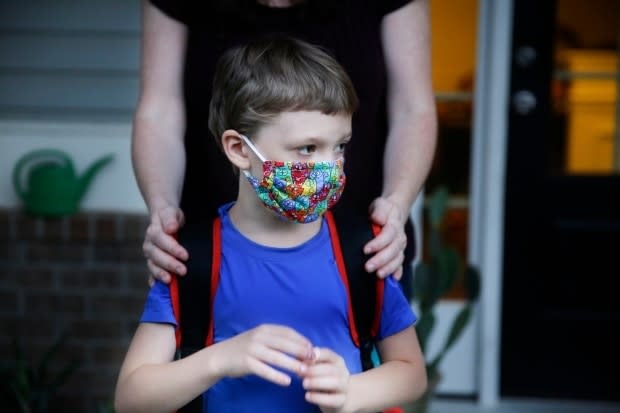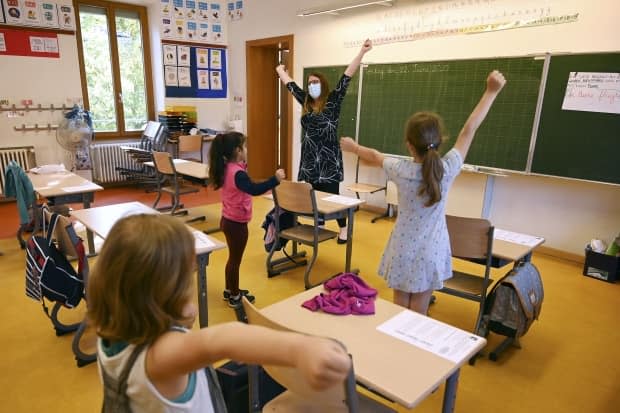Hundreds of Quebec teachers express confusion, anxiety and dissatisfaction with government as schools reopen

With the start of school just days away in Quebec, teachers and other education workers around the province say the school system is still not prepared to resume in-class teaching amid the threat of COVID-19.
Nearly 2,000 teachers, principals and other education workers in public schools filled out an email questionnaire circulated last week by CBC Montreal and Radio-Canada.
Their responses indicate deep-seated concerns about their personal safety, high levels of anxiety, confusion about government guidelines and widespread dissatisfaction with Quebec Education Minister Jean-François Roberge.
Nearly 85 per cent of those who completed the questionnaire said it will be either "somewhat difficult" or "very difficult" to ensure public-health guidelines are respected when classes resume in the coming days.
"I feel like we're starting the year blind, and it's wildly unnecessary for us to start the year this blind," James Kennedy-Zimmerer, a teacher at Chateauguay Valley Regional High School in Ormstown, Que., said in a follow-up interview.
"Kids are not very cautious; they don't take it seriously. It's very likely that in the first week, one of these older kids is going to mockingly cough on somebody else just for the sake of it."

Guidelines revised, fears remain
Earlier this month, Roberge revised Quebec's back-to-school plan, bringing it in line with the latest research on how the novel coronavirus is transmitted.
According to the latest version of the plan, students in Grade 5 and above will have to wear masks when moving around the school, but won't have to wear them in class.
Once inside the classroom, students also won't have to physically distance from each other, but will have to stay at least two metres away from their teacher at all times.
Students also won't be allowed to interact with anyone from outside their class. Unlike in Ontario though, where some high school classes will be capped at 15 students, no provisions have been made to reduce class sizes in Quebec.
That's a source of concern for hundreds of Quebec teachers. "I regularly had groups of between 30-34 students last year," one high-school teacher wrote in response to an open-ended question on the questionnaire.
"I had difficulty walking between the desks, so the students were clearly less than two metres apart from each other."
Of the 1,574 teachers who responded to the questionnaire, more than 60 per cent recommended cutting class sizes in half in order to ensure the guidelines are respected, and their safety ensured.
Opinions contained in the CBC questionnaire should be treated differently from the results of a public opinion poll. The sample of respondents is not necessarily representative of either the voting public or of the 100,000 elementary and high-school teachers in the province.
"Why we haven't shrunk our class sizes down to make social distancing possible is something else that is sort of still beyond us," said Kevin Saunders, a high school teacher in Montreal's West Island who oversees a popular Facebook page for teachers.
Other teachers were supportive of the government's decision to keep classes the same size as before the pandemic, hoping it would reduce the need for online learning, which they felt is less effective.
"Parents do not understand how difficult it is to create and implement on-line classes," wrote a teacher at an English high school in Montreal. "Normal teaching strategies do not transfer well and Zoom classes are forced and unnatural."
Masks in the classroom?
As it is, there is widespread fear that schools won't be a safe place to work with the current guidelines in place.
One Montreal teacher, who said with over 20 years experience teaching art, told CBC Montreal: "I have to be realistic. It's not going well. What I've seen is chaotic. Everything is all over the place and illogical."
More than 1,200 respondents to the questionnaire indicated they also felt either "very" or "somewhat" unsafe with the current reopening plan. Similar numbers said they are feeling more anxious compared to this time last year.
"I feel like they're throwing me into the lion's den and hoping everything goes well," wrote a high-school teacher with more than 20 years of experience.
In an open-ended question asking respondents to describe their particular concerns, several dozen teachers indicated they wanted to see masks made mandatory inside classrooms
"It bothers me that the [government] has not mandated mask-wearing in class," wrote one Montreal elementary school teacher. "Let's not make this political. Let's just say, we wear because we care."
Another teacher elementary school teacher from Montreal wrote: "Who is protecting the teachers if neither distancing or masks are required of students. I have the impression of being sacrificed for the benefit of the school system."
Quebec's Education Ministry has told school boards and service centres (the administrative bodies that recently replaced French-language school boards) they cannot draft their own rules to make masks mandatory in the classroom.
That, too, is in contrast with Ontario's policies. Some school boards in Toronto will require students beginning in Grade 1 to wear a mask when indoors, including in the classroom.
WATCH | Quebecers stage opposing protests as schools prepare to open:
Unhappiness with education minister
The education workers who completed the CBC/Radio-Canada questionnaire expressed ambivalence about the government's back-to-school plan, with large numbers saying they felt it was neither a step in the right or the wrong direction.
There was less ambivalence about the education minister himself. Nearly 80 per cent of those who responded indicated they were unsatisfied with how Roberge has handled the crisis.
CBC Montreal conducted more than a dozen follow-up interviews with teachers to better understand their concerns about returning to classrooms.
Several said Roberge had not provided enough details about how his back-to-school plan will work in practise.
"We don't have more information than what he says at the press conferences," said Linzee Perreault, who teaches physical education in kindergarten and high school.
Many teachers also said they still don't know how online teaching will be organized, though Roberge promised it would be available to every student in the province.
WATCH | Quebec's education minister explain his back-to-school plan:
Many don't know, too, if they will be paid during periods of quarantine, or if there will be rules governing what personal protective equipment they can wear in school.
Saunders, the West Island high-school teacher, said his colleagues were dismayed at the lack of preparation despite the minister having months to prepare for the return-to-school.
"It's just a feeling of total frustration. Five months have gone by ... and absolutely nothing has been done," Saunders said.
"We're not even doing basic social distancing. Like we're not even doing the things that everyone else in society is doing right now."
A spokesperson for Roberge did not respond to a request for comment.
The federal government is expected to announce later today that it will transfer $2 billion to the provinces and territories to help them fund back-to-school measures.
Students in Quebec will begin returning to school later this week.
Methodology
On Aug. 19, CBC Montreal/Radio-Canada sent a bilingual questionnaire to 9,957 email addresses that were listed on Quebec public school websites. The questionnaire closed on August 24 at noon. A total of 1,952 people completed the questionnaire. This is a breakdown of their roles in the education system:
1,574 teachers.
30 administrators.
131 support staff.
170 education specialists.
61 other.
Of these, 29 per cent indicated they worked in the English-language system and 71 per cent indicated they worked in the French-language system. The English version of the questionnaire can be seen below.


